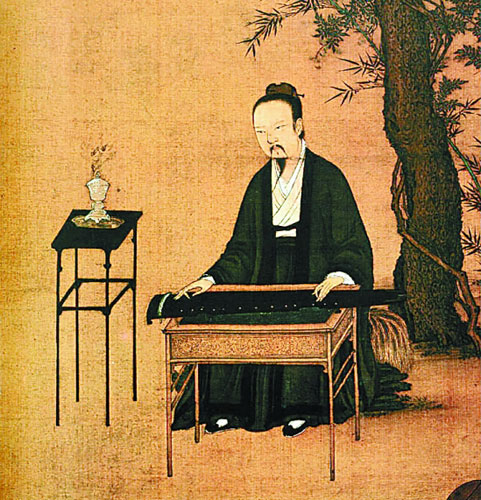spring view
in a shattered nation mountains & rivers endure;
in the city this spring, trees & grass grow lush—
in keeping with the season, dewy blossoms weep;
regretting their parting, birds seem skittish—
beacon fires have burned for three months running;
a letter from family is worth ten thousand gold—
I worry my hoary head till the hairs grow sparse:
soon there won’t be enough to hold a hairpin
Jack Hayes
© 2016
based on Du Fu: 春望
chūn wàng
Note: This is one of Du Fu’s most famous poems & has been widely translated. The last couplet proved a conundrum for my translating partner Sheila Graham-Smith & myself. In this “final” version, we’ve gone with a conventional reading. All major English translations have to do with the fact that the poet is rubbing/scratching/worrying his head so much his hair is falling out, & it will soon be so thin it won’t hold a hairpin. It was common for Chinese men to do their hair up in a topknot held in place with a hairpin. See illustration.

Sheila however pointed out that the final two lines could mean something like “worrying my white head changes little/these troubled longings couldn’t overcome a hairpin.” Sheila is a talented poet, a fantastic reader of poetry, & someone with an uncanny intuition when it comes to interpreting poetic lines (whether in her own language or in another); her arguments always carry great weight, & while she eschews taking any credit for the translations themselves, this project would never have gotten as far as it has without her dedication & insight. In fact, the characters certainly could mean exactly that.
Still, at this point at least we’re going with the conventional reading. We called in a fluent Mandarin speaker & scholar on the question, & that person came down—though not decisively—on the conventional side.
In any case, it’s an interesting problem. Classical Chinese is famously ambiguous, & Classical Chinese poetry even more so. The whole question reminds me of translator Stephen Owen’s remark that no one has enough Chinese to really understand Du Fu; & Owen should know: he’s translated the entire opus of the great Chinese poet.
Images links to their sources on Wiki Commons:
1. Tang Dynasty hairpin.
Photo by Wiki user Daderot who makes it available under the following license:
This file is made available under the Creative Commons CC0 1.0 Universal Public Domain Dedication.
The person who associated a work with this deed has dedicated the work to the public domain by waiving all of his or her rights to the work worldwide under copyright law, including all related and neighboring rights, to the extent allowed by law. You can copy, modify, distribute and perform the work, even for commercial purposes, all without asking permission.
2. 12th century illustration of Hanfu. Public domain.
No comments:
Post a Comment
Thanks for stopping by & sharing your thoughts. Please do note, however, that this blog no longer accepts anonymous comments. All comments are moderated. Thanks for your patience.